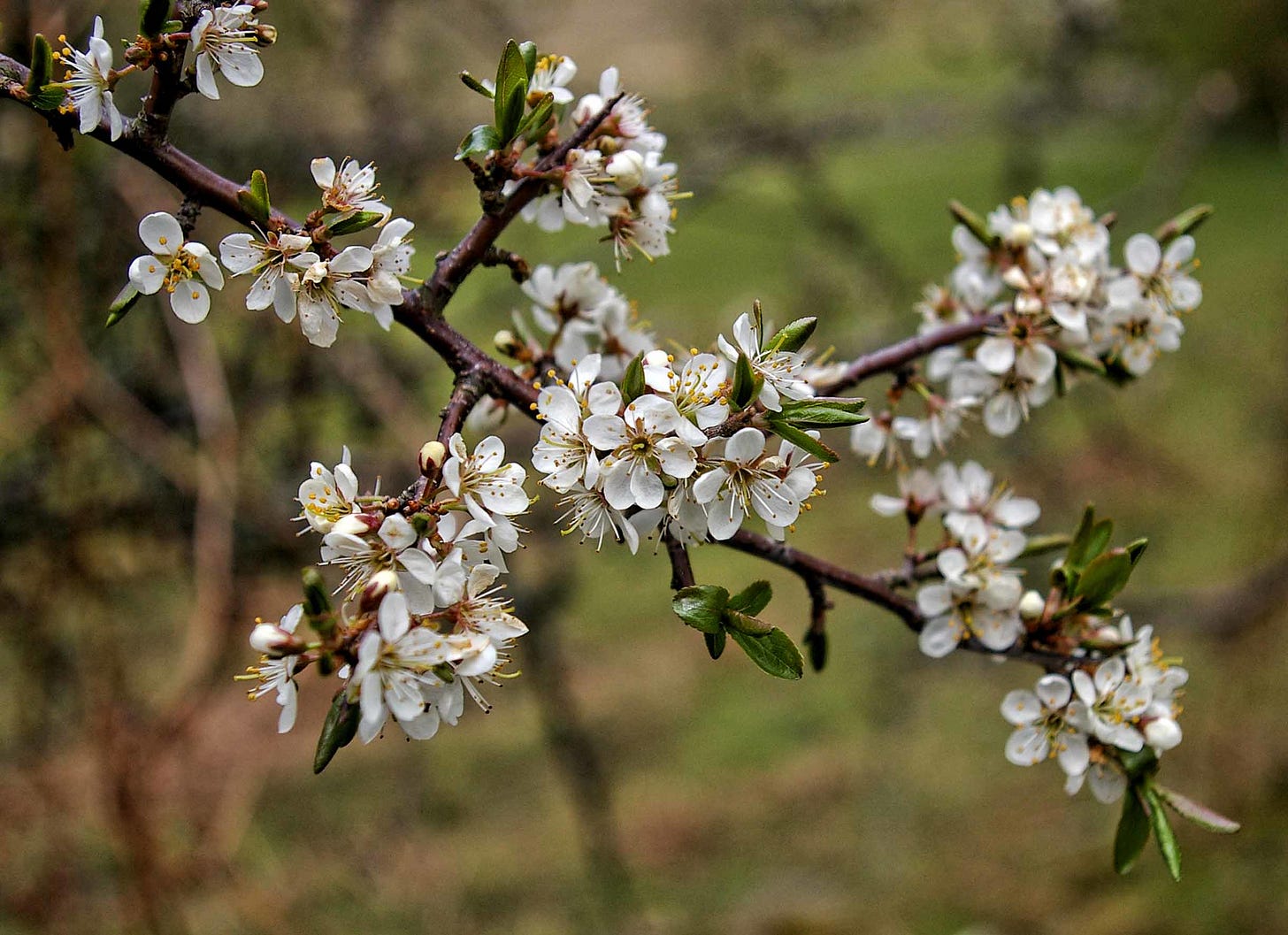Spring dries into summer, and the hawthorns are having a fine year. White and woolly on the greening ground, they could be upright celestial sheep. Beautiful as they are, though, they’re not for me. My heart belongs to their cousin; and her time is the start of spring, when weakness and responsibility kept me from writing.
Hawthorn makes its leaves first, then flowers; but blackthorn flowers on a bare branch. Just as the lambs stumble and hop, its dark angular lines birth ten thousand tiny white cups. Mocking winter’s snow, it summons spring. ‘Watch!’, it laughs, ‘Watch these old spikes burst into life. Soon this old land will too’. I’m sure other places have their own plant languages; but in these hills, for me, it is blackthorn that utters the promise of life. More than any other plant, it reminds me of death.
Blackthorn blossoms fleetingly. Some years, its full glory barely lasts longer than a day. Perhaps old tales are true, and a cold snap always follows its flowering: as though the dying winter, too weak to stop the prophecy, punishes the prophet instead. So when the thorn reassures me I have lasted another year and whispers of the one to come, I wonder how many more times it will bless me. Life always bursts anew from death, just as it promises; but my one life will not. I owe the earth a body, and will have to pay it back soon enough.
My parents raised me honest. I don’t mind giving back what I borrow. But when I think of the shortness of our days, I mourn the weakness of my attention. So many years I waste in my own mind, so few moments in the wonder of the world. A town boy, I didn’t even know blackthorn’s name till my twenties; and didn’t learn to see it, the little that I have, till later still.
I remember a morning twenty years ago, drizzly, in a Yorkshire town. I knew the countryside a little then, but had fallen back to my own beginnings. An old man, of what they now call the Windrush generation, looked out over a patch of scrub. As I passed him, I said ‘the buds are about to burst’. He agreed, but with surprise. He didn’t think the English saw these things. In the towns, we mostly don’t. And still I see so little of the world I have been lent.
When I die, bury me beneath the blackthorn. When it flowers, don’t remember me. Just laugh with it at the weakness of death.
Image: Blackthorn by Jean Mottershead (CC BY-NC-ND 2.0)



Good to read your words again. The connection here between the budding time and the thought of death took me back to Larkin's The Trees, which has been on my mind this spring.
The trees are coming into leaf
Like something almost being said;
The recent buds relax and spread,
Their greenness is a kind of grief.
.
Is it that they are born again
And we grow old? No, they die too,
Their yearly trick of looking new
Is written down in rings of grain.
.
Yet still the unresting castles thresh
In fullgrown thickness every May.
Last year is dead, they seem to say,
Begin afresh, afresh, afresh.
Thank you for this meditation. “Plant languages”: I love that. The flowering of trees on our street is one of the magical parts of spring: for a week or two, the air is so beautifully perfumed. And then it’s over, as the weather warms up (which it did in a big hurry this spring. May felt like July).
I think about mortality too, and usually the thought is not overwhelming, unless it’s 3am, then everything is. Interesting, I never questioned how old you are just from reading your writing. :-)